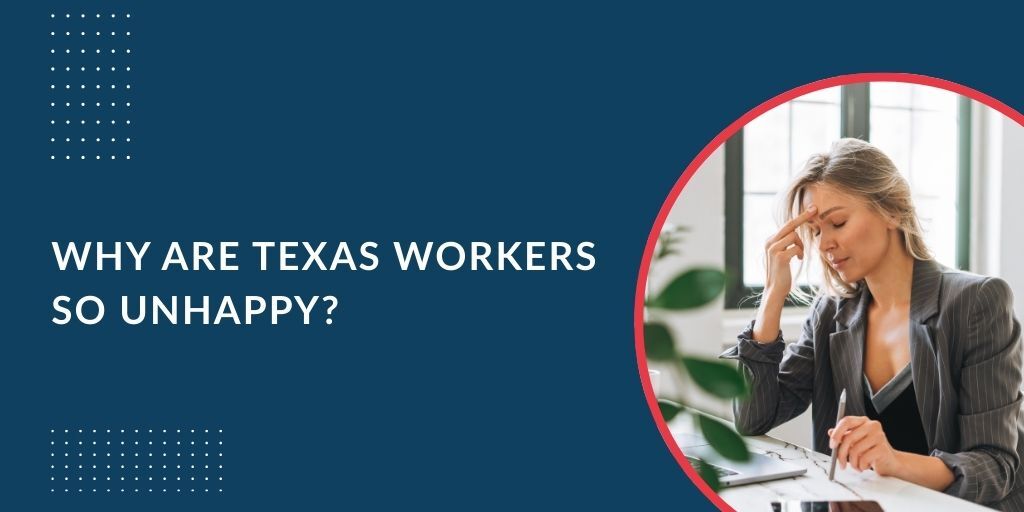Why Are Texas Workers So Unhappy?
In a new study by digital agency Design Rush, workers in Texas are among the least happy in the country. The third least happy to be exact. How did they come up with this statistic?
Design Rush took data from Wallet Hub in the following areas:
- Employee morale
- Wage fairness
- PTO (paid time off)
- Healthcare costs
- Average weekly work hours
Each state was scored on a 50-100 scale; the closer to 100, the higher the worker satisfaction. Texas scored 56.37, ranking it 48 out of 50 states.
Texas reported higher than average wage disparity, longer than average hours, and higher than average healthcare costs as reasons for dissatisfaction. In contrast, Maryland ranked number 1 with a score of 90.26, bolstered by generous PTO, lower average hours, and lower healthcare costs.
This ranking comes after a separate report from earlier this year highlighting the difference in working hours between American and European workers. Two Texas cities ranked in the 50 hardest working cities in the US; Austin at number 6 and San Antonio at 47.
What about state employees?
 TPEA has conducted a great deal of research regarding state employees' compensation and it is no secret that state salaries have fallen behind private sector salaries. According to the State Auditor's Office, state salaries are a full 7.4% behind the current market rate.
TPEA has conducted a great deal of research regarding state employees' compensation and it is no secret that state salaries have fallen behind private sector salaries. According to the State Auditor's Office, state salaries are a full 7.4% behind the current market rate.
Employee satisfaction is closely tied to compensation, both in salary and benefits. Higher salaries also mean less less turnover, which helps agencies maintain continuity and legacy knowledge.
When the legislature funded two across the board pay raises for state employees during the 2023 legislative session, the average turnover rate decreased from 22.7% to 16.5%. Although it's going in the right direction, it is still high. It's one of the reasons TPEA advocates for state employees and retirees. We want to ensure Texas continues to grow and be prosperous, and that starts with the people who serve Texans.
Does working harder = more productivity?
With Texas workers reporting an average work week of 43.5 hours, there’s no doubt that Texas workers are putting in the time. But does that impact productivity?
“Overworked Americans are not necessarily more productive. The cumulative effects of stress, lost sleep, and time away from family and friends tend to mount as the workweek grinds on,” said Keith Cunningham-Parmeter, Professor of Law at Lewis & Clark School in the report.
When it comes to state employees, there is no doubt that they go above and beyond, both in hours and in effort. With the passing of HB 5196, agencies have the autonomy to set telework policies that can positively impact their workforce.
In addition, things like regular pay raises, minimal healthcare cost increases, increased benefits, and supportive policies can help contribute to worker happiness, both in the private sector and in public service.
We want to hear from you!
What policies could be implemented that would increase your satisfaction as an employee?


